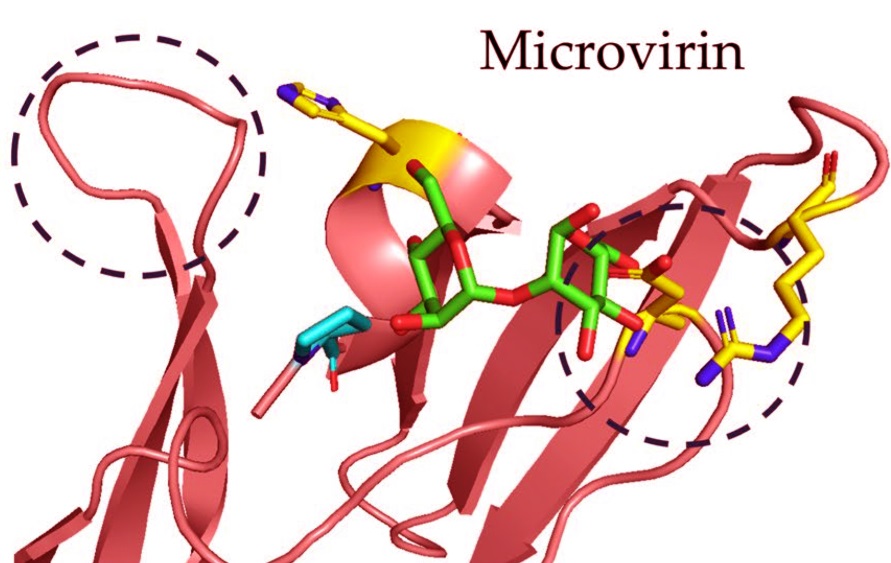Nikhil Prasad Fact checked by:Thailand Medical News Team Jan 12, 2025 3 months, 1 day, 5 hours, 22 minutes ago
Medical News: A recent study conducted by researchers at Drexel University College of Medicine and Drexel University’s Department of Chemical and Biological Engineering-USA has shed light on the unique properties of Microvirin, a protein with promising antiviral capabilities. This groundbreaking research focuses on Microvirin’s ability to inhibit HIV-1 cell infection by targeting the virus’s envelope glycoprotein gp120. The findings could pave the way for innovative therapeutic strategies against HIV-1, which remains a global health challenge.
 The Lectin Microvirin Shows Potential in HIV-1 Treatment
The Role of Microvirin in HIV-1 Inhibition
The Lectin Microvirin Shows Potential in HIV-1 Treatment
The Role of Microvirin in HIV-1 Inhibition
Microvirin is a monovalent lectin, structurally similar to the well-known Cyanovirin-N but distinct in its simpler glycan-binding mechanism. Unlike Cyanovirin-N, which exhibits multivalent interactions, Microvirin binds to gp120 in a 1:1 stoichiometric ratio. This
Medical News report explores how the researchers used mutagenesis to uncover the specific amino acids that contribute to Microvirin’s interaction with gp120. The study’s findings provide critical insights into the role of uncharged polar and non-polar residues in forming a hydropathic recognition site, enhancing our understanding of Microvirin’s antiviral function.
Microvirin (MVN) is one of the potent antiviral lectins, which was initially isolated from Microcystis aeruginosa and has been shown to have only minor cytotoxicity and mitogenic effects as compared to other antiviral lectins.
https://pmc.ncbi.nlm.nih.gov/articles/PMC7077325/
Key Findings of the Study
The study utilized advanced techniques such as enzyme-linked immunosorbent assays (ELISA), surface plasmon resonance (SPR), calorimetry, and virus neutralization assays to investigate Microvirin’s interaction with gp120. The research highlighted several important discoveries:
-Binding Mechanism: Microvirin’s mannobiose-binding site comprises residues that form a hydropathic surface. Key polar and non-polar residues, such as Q54, N44, T59, and E58, contribute significantly to the protein’s binding efficiency.
-Impact of Mutations: Through mutagenesis, researchers replaced specific amino acids with alanine to assess their role in gp120 binding. Mutations such as Q54A, N44A, and T59A were found to completely abolish binding, underscoring their critical role in maintaining the binding pocket’s stability.
-Hydrogen Bonding: The study identified direct hydrogen bonding interactions between mannobiose and Microvirin’s residues, particularly E58 and Q54. However, even residues without direct interactions, like N44 and T59, played vital roles in stabilizing the mannobiose-binding pocket.
-Biological Assays: Functional assays demonstrated that Microv
irin variants retained the ability to inhibit HIV-1 infection in various viral strains, including Bal.01, YU2, and JRFL. Notably, some mutations, such as N55A and E58A, showed reduced but not eliminated antiviral activity, further elucidating the importance of specific residues.
Broader Implications
The study’s findings have significant implications for the development of new HIV-1 therapies. By defining the precise mechanisms of Microvirin’s engagement with gp120, researchers have opened avenues for designing targeted lectin-based inhibitors. These inhibitors could potentially offer a safer and more effective alternative to current treatments, particularly for patients who experience resistance to antiretroviral drugs.
Moreover, the discovery of key stabilizing residues in Microvirin’s binding pocket may inspire the engineering of enhanced lectin variants with improved binding affinities and broader antiviral capabilities. The simplicity of Microvirin’s monovalent interaction also suggests potential advantages in terms of reduced off-target effects and lower toxicity compared to multivalent lectins.
Conclusions
The study conducted by the team at Drexel University College of Medicine and Drexel University has provided groundbreaking insights into the potential of Microvirin as an HIV-1 inhibitor. By elucidating the molecular mechanisms underlying its glycan engagement, the researchers have laid the foundation for future innovations in antiviral therapy. The discovery of key residues that contribute to gp120 binding offers valuable guidance for designing next-generation lectins with enhanced efficacy and safety profiles.
In summary, Microvirin’s unique properties and its ability to inhibit HIV-1 infection through targeted engagement of gp120 glycosylation sites represent a promising advancement in the fight against HIV/AIDS. The simplicity of its mechanism, combined with its low toxicity profile, makes it an attractive candidate for further development as a therapeutic agent. As the global health community continues to seek effective solutions for combating HIV-1, the findings of this study underscore the importance of innovative research and collaboration.
The study findings were published in the peer-reviewed journal: Viruses.
https://www.mdpi.com/1999-4915/17/1/82
For the latest HIV News, keep on logging to Thailand
Medical News.
Read Also:
https://www.thailandmedical.news/news/new-approach-against-influenza-and-herpes-simplex-viruses-using-chewing-gum-infused-with-lectins
https://www.thailandmedical.news/news/exploring-how-lectins-could-unlock-new-treatments-for-covid-19
https://www.thailandmedical.news/news/shictin-a-novel-lectin-from-shiitake-mushrooms-shows-promise-in-combating-covid-19-omicron-variant
https://www.thailandmedical.news/news/herbs-and-phytochemicals-griffithsin-a-lectin-derived-from-the-red-algae-is-able-to-inhibit-influenza-a-and-sars-cov-2-viruses
https://www.thailandmedical.news/news/sars-cov-2-inhibition-using-leek-extract-and-lectins-including-concanavalin-a-
https://www.thailandmedical.news/news/covid-19-news-californian-study-shows-that-antiviral-activity-of-the-lectin-griffithsin-against-sars-cov-2-is-enhanced-by-presence-of-membrane-protein
https://www.thailandmedical.news/articles/hiv-aids
